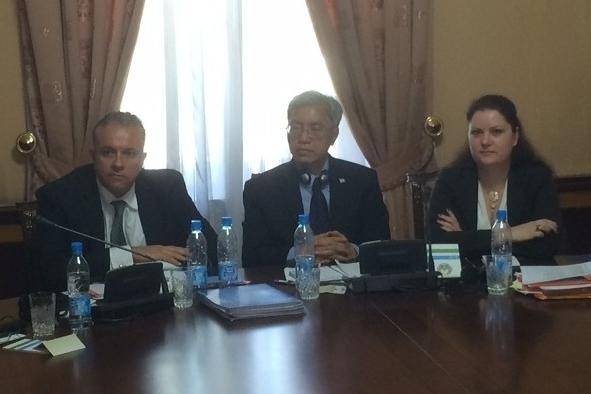
At MFA reception house
On behalf of the Counter-Terrorism Committee (CTC), its Executive Directorate (CTED) concluded a three-day follow-up assessment visit to Uzbekistan on 16 April 2015. The delegation discussed with Government authorities their implementation of different aspects of provisions of Security Council resolutions 1373 (2001), 1624 (2005) and 2178 (2014) relating to legal matters, international cooperation, law enforcement, and border management.
Uzbek authorities informed about progress achieved since the initial visit by CTC in July 2009, in particular regarding the shift from pure law enforcement measures to a comprehensive approach aimed at preventing conditions conducive to terrorism, including close cooperation with local communities at the level of “mahalla” (community divisions) committees and chairs, as well as a number of legislative amendments relating to criminal proceedings.
New threats and challenges, including the foreign terrorist fighters phenomenon and terrorists’ abuse of the Internet, were also discussed. It was agreed that the terrorist threat, which is of a transnational nature, can only be countered with peaceful means and with a comprehensive and integrated approach, with the United Nations playing a coordinating role. The delegation also discussed the facilitation and delivery of technical assistance needs and capacity-building requirements that would help to meet those new challenges.
In addition to experts from CTED, the delegation also included representatives of the United Nations Security Council to resolutions 1267 (1999) and 1989 (2011) concerning Al-Qaida and associated individuals and entities — the Security Council Committee established pursuant to resolution 1540 (2004) — the Anti-Terrorism Centre of the Commonwealth of Independent States (ATC-CIS), the Eurasian Group on Combating Money-Laundering and the Financing of Terrorism (EAG), the International Organization for Migration (IOM), the Organization for Security and Co-operation in Europe (OSCE), the Regional Anti-Terrorist Structure of the Shanghai Cooperation Organization (RATS SCO), and the Terrorism Prevention Branch of the United Nations Office on Drugs and Crime (UNODC/TPB).

